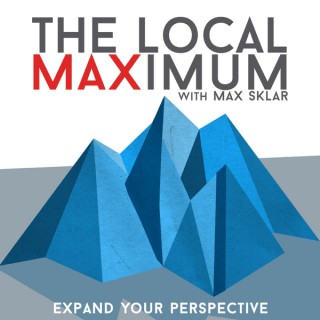Podcasts about gresham's law
- 10PODCASTS
- 10EPISODES
- 44mAVG DURATION
- ?INFREQUENT EPISODES
- Feb 23, 2021LATEST
POPULARITY
Latest podcast episodes about gresham's law
Ep. 159 - Gresham's Law, More Google Drama, Self Driving San Francisco
In today's February News update, we go over Gresham's Law, more firings at the Google AI ethics lab, Waymo expanding driverless cars to San Francisco, and the future and past of audio with the passing of Rush Limbaugh and the rise of Clubhouse.
What does an economic principle about currency have to do with our worship of God? Check out this week's devotion to find out! References: 1) Malachi 1:6-14 2) 1st Chronicles 21:22-27 3) Colossians 3:23-24 Email: pausetoconsiderpodcast@gmail.com Want to learn more about what I believe? Visit thisisyourbible.com If you're interested in additional listening material, check out - wcfoundation.org/podcasts Social Media: Facebook | Instagram --- Send in a voice message: https://anchor.fm/pausetoconsider/message
Mental Model: The Law of Competing Standards (Gresham's Law)
Stock Stories | Case Studies and Mental Models for Individual Investors
Basic Idea - what gets rewarded gets repeated, regardless of any ethical considerations. Specifically “bad money drives out good” History - named after Sir Thomas Gresham, who was an English Merchant in the 1500s. Also attributed to Copernicus and Aristophanes. Gresham brought to public attention that, in an economic system with fake coinage, the fake coinage will drive out the real coinage in circulation. People will keep what is valuable and spend what is not. A few ways to interpret this: Things of value will tend to become more scare, while copycats and imitators will proliferate in a given market place Systems of morality tend to fade away when practical benefits that appeal to human nature overshadow it Example: savings and loans crisis in the 1980s Interest rates from the Federal Reserve started rising higher than the rate at which S&L’s were paying out interest on deposited funds...recipe for disaster S&Ls, instead of immediately becoming insolvent, began to invest in speculative ventures, reaching for yield A lack of regulation contributed to this slow but painful downfall Example: sub-prime mortgage crisis Comedian Kathleen Madigan: “sure, put down birthday clown” Anyone who wanted a mortgage could get one, as banks were thirsty to increase their profits without thoroughly accounting for the risks of their lending profile Investing look for management behavior within a particular company or industry. Is a CEO taking some corporate action just because their competitors are doing it? Even if it doesn’t make any sense? For-profit prisons - yes you can invest in them. No I would never invest in them. Simply because people have made money with privatization of prison systems around the world doesn’t mean it should be that way - morality enters the investing process and is highly personal No matter how much an annual report (see GEO Group) talks about charitable donations or how many “participants” are awarded GEDs, the business model is fundamentally flawed because the success of the company’s owners is diametrically opposed to the progress of civilization...primarily because people are jailed against their will and subject to legal and cultural systems that do not have their best interest at heart Prisons do need to exist at some level but I do not believe they should have a profit motive
January 23 - Elizabeth I opens the Royal Exchange
On this day in Tudor history, 23rd January 1571, after dining with its founder, Sir Thomas Gresham, Queen Elizabeth I opened the Royal Exchange in London. Find out more about the official opening, what the Royal Exchange was, why Gresham paid for its building, and what happened to it, in today's talk from Claire Ridgway, author of several Tudor history books. Book recommendation: Gresham's Law by John Guy You can see this podcast as a video at the following link:https://youtu.be/1FZGLxm2nPs Also on this day in Tudor history, on 23rd January 1516, King Ferdinand II of Aragon died. Find out more in last year's video - https://youtu.be/MtHhkC2jmi4
Rob Tracinski talks with David French, lawyer and writer for National Review, about "David French-ism" and the debate between liberal and illiberal conservatives. The conversation includes: life as an "ism," how Donald Trump gives people permission to be bad, how liberalism defends itself with its own "antibodies," Protestants versus Catholics, how campus insanity used to be much worse, how the nationalization of politics fuels the culture war, the Gresham's Law of the Internet, and the future of the word "liberalism." For more commentary and analysis, visit The Tracinski Letter at www.TracinskiLetter.com. Support us at patreon.com/SalonoftheRefused.
Listen to WCN Audio Podcasts:https://itunes.apple.com/us/podcast/world-crypto-network/id825708806?mt=2Call Us LIVE!SKYPE WorldCryptoNetworkTrack the Mayer Multiple on WCN: https://www.worldcryptonetwork.com/priceCheck out the brand new http://WorldCryptoNetwork.com/Follow WCN on Twitter:https://twitter.com/WorldCryptoNetSubscribe to the WCN YouTube Channel and participate in the live chat!https://www.youtube.com/user/WorldCryptoNetworkFollow the best podcasts from the best minds in the Bitcoin and Cryptocurrency space on twitter.https://twitter.com/bitcoinpodcasts
This week we talk about Gresham's Law, drop shipping, and Section 230. We also discuss FOSTA-SESTA, stealing books, and reeded coins. For more information about this podcast and to view the copious show notes, visit letsknowthings.com. Become a patron on Patreon: patreon.com/letsknowthings You can find a list of the books I've written at Colin.io. I'm going on tour: BecomingTour.com
David Dayen on "Chain of Title" & Housing Choices
30 May 2016 - I have a house rabbit named David Dayen. That's how highly I think of our guest this week. Dayen is a highly respected financial news and economics journalist for a reason. He finds a way to make even the most dry and dense topics understandable while also making it absolutely clear why we should all care. David's first book, Chain of Title: How Three Ordinary Americans Uncovered Wall Street's Great Foreclosure Fraud (also on Audible.com here), is meticulously researched and a deep dive into the foreclosure crisis. Typical of David he found a unique way into the story through the lens and lives of three regular people who, instead of going quietly into the dark of foreclosure shame, chose to shine a revelatory light. Whatever you know about the foreclosure crisis sprouted, quite directly, from the questions Lisa, Michael and Lynn asked and the shocking answers they unearthed. Heroes are those who run into the fire, into the storm, to bring others to safety. Chain of Title is a gripping, true-to-life rendering of the lives of heroes and the deeds of villains. And, whether you know it or not, what this handful of people discovered changed your life. You can follow all of David's writing here and I strongly recommend subscribing to his weekly summary e-mail. I lead into David's interview with some information about Gresham's Law, the idea that bad money drives good money out of the market, meaning that Wall Street criminals make it virtually impossible for competitors to continue to abide by the law. I also talk about something that seems obvious, asymmetric information, meaning that the seller knows more than the buyer. One would think that was as plain as the orange on a carrot but three people won the Nobel in economics for describing how asymmetric information influences macroeconomics and, in the case of Wall Street, further influences the criminographic environment. Will brings up something which so often gets left out of the political mix, housing. He observes that the desires and right to choice of those who are among the most vulnerable in our society, the homeless, must be sine qua non to any array of solutions. Will uses, as an example, a heart rending description of the state of homeless shelters in Washington, DC. Will and I open the show with what can only be described as a rant. I read an article this week which eloquently encapsulates my feelings regarding the 2016 Democratic primary, Misogyny Rules the 2016 Election by Victoria A. Brownworth. I truly am done with the sexism which is spreading, from the top down, through the Sanders campaign. Bernie's silence, in some cases, and defense, in others, regarding the violence being committed against women by his campaign makes it clear that it is a leadership-lead issue. Bernie reveals himself with the lack of women (with the glaring exception of his wife) in the upper tier of his campaign as well as his shocking opinion that he believes Hillary to be "unqualified" to be President. (His too little, too late "apology" not withstanding.) Bernie's personal rage at the world has permeated all facets of his campaign. He and his cult are frightening women...on purpose. Bernie could have been great. Instead he is the leader of a cult that is tilting ever more toward increasing degrees of violence. History will remember him as an old, white man who, while choking on his privilege, turned away from leadership and toward ignominy. Good riddance. - Arliss First off, I apologize for the lack of music in today's show. We simply had too much content and not enough time. I had to cut my discussion of Bernie's e-mails and a section from my block where Arliss and I discussed the Tiny House movement. Across the nation communities have begun using tiny house neighborhoods as part of a menu of solutions for homeless housing. Tiny houses provide homeless folk with a place of their own, an address, a place to sleep protected from the elements, a place to cook th
George Selgin of West Virginia University talks with EconTalk host Russ Roberts about free banking, where government treats banks as no different from other firms in the economy. Rather than rely on government guarantees to protect depositors (coupled with regulation), banks would compete with each other in offering security and return on deposits. Selgin draws on historical episodes of free banking, particularly in Scotland, to show that such a world need not be unduly hazardous or filled with bank runs. He also talks about Gresham's Law and an episode in British history when banks successfully issued their own currency.
George Selgin of West Virginia University talks with EconTalk host Russ Roberts about free banking, where government treats banks as no different from other firms in the economy. Rather than rely on government guarantees to protect depositors (coupled with regulation), banks would compete with each other in offering security and return on deposits. Selgin draws on historical episodes of free banking, particularly in Scotland, to show that such a world need not be unduly hazardous or filled with bank runs. He also talks about Gresham's Law and an episode in British history when banks successfully issued their own currency.













